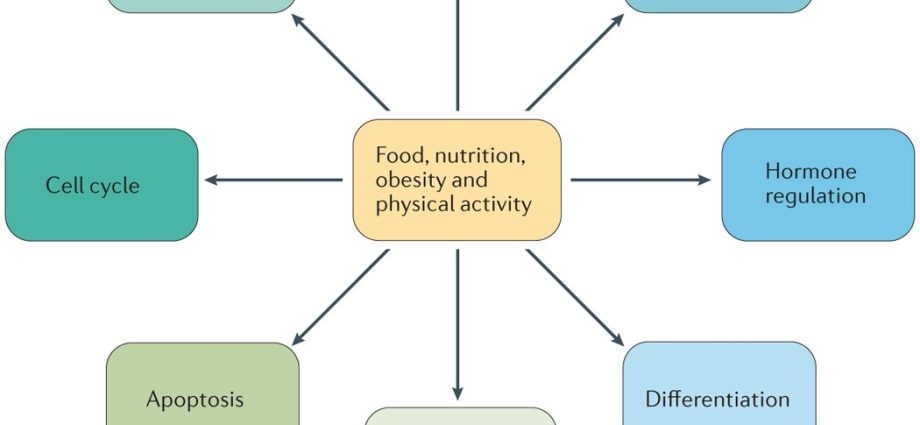Contents
Nutrition plays a huge, though not fully understood, role in cancer: both in the process of cancer development, in the treatment of the patient and in people whose cancer has been cured. Incorrect habits are conducive to the formation of some types of cancer, and on the other hand, an appropriate diet supports the treatment of a person suffering from cancer.
Incorrect eating habits and cancer
Improper eating habits put a strain on our health, causing many diseases, including the formation of certain types of cancer. For example, stress in combination with an unhealthy diet (large intervals between meals, unvaried diet), promotes the formation of stomach cancer. Obesity, which results from consuming too much simple sugars and saturated fat, is closely related to cancers such as postmenopausal breast cancer, colon and rectal cancer, and pancreatic cancer. The mechanisms responsible for the formation of cancer as a result of an incorrect diet are very complex, difficult to detect and therefore still not fully understood. Scientists have managed to establish the relationship between obesity and the formation of certain types of cancer. Obesity is related to, inter alia, with characteristic metabolic processes (which disrupt the hormonal balance) and the so-called obesity-related metabolic syndrome. One such process, which affects people with abdominal obesity, is the accumulation of high levels of hormones and growth factors (special substances that stimulate cells to divide) in adipose tissue. In addition, obesity is associated with chronic (although asymptomatic for the individual) inflammation that can turn healthy cells into cancerous cells. Another factor that contributes to the development of cancer is alcohol, which is often associated with smoking. Alcohol causes the harmful substances produced during smoking to enter our body more easily, which increases their concentration and can damage healthy cells more effectively. Moreover, alcohol itself is irritating to the oral mucosa and burdens the liver cells.
Proper nutrition in cancer
In cancer itself, proper nutrition is very important, because the patient needs strength and energy to fight, and unfortunately, in most patients, proper nutrition is disturbed at an early stage of the disease. It happens completely unconsciously, the patient ceases to feel hungry, or, for example, the pain that the patient experiences causes reluctance to eat meals. Doctors are advised to make the patient aware of the appropriate diet and to monitor it at all stages of treatment as soon as the patient is diagnosed with the disease, even after the patient has recovered.
Optimal nutritional status is an important goal in the treatment of cancer patients at all stages of the disease. Throughout cancer, the body’s requirements, and therefore the goals of nutrition, may differ, but the point is always to ensure that a person takes the right amount of nutrients necessary for him. The diet must be adapted to the requirements of the body at any given time, so it will depend on whether the patient is on active therapy or out of therapy, is in remission of the disease, and aims to avoid the cancer coming back.
A well-chosen diet and eating habits help patients maintain their weight at an appropriate level, maintain the proper level of nutrients in the body, thanks to which the patient experiences fewer effects of the deficiency of individual substances (vitamins, micro and macro elements, fats, etc.), thanks to which the patient’s standard of living is higher . Poor or inadequate nutritional practices can contribute to malnutrition, which in turn increases the side effects of the applied therapies (including radio and chemotherapy) and increases the risk of infection, all of which make the patient’s chances of survival decrease.
Factors that affect improper nutrition in a cancer patient include: lack of appetite or reluctance to eat, nausea, vomiting, diarrhea, constipation, stomatitis, mucositis, dysphagia (i.e. a problem with swallowing), changes in tastes and smells, pain and poor mental state: depression and anxiety. Recognizing the problem early helps to fight it more effectively and find the right ways to get the person on the right diet.
Aims of a proper diet in cancer
The overall goals of adequate nutrition during illness are:
– Prevention or replenishment of nutrient deficiencies *
– Maintaining an adequate, but lean body mass *
– Better tolerance of treatments that patients undergo during treatment *
– Minimizing the side effects of treatment (radio and chemotherapy, surgery, immunotherapy) *
– Maintaining strength and energy *
– Protection or support of the immune system, reducing the risk of inflammation *
– Helping you regain health and a high quality of life
For patients who are in the advanced stage of their disease, goals have a more focused profile. It is worth emphasizing that for such patients, the goal is not to gain weight or reverse malnutrition, but to provide comfort and relief from symptoms. Such goals include:
– reduction of side effects of therapy *
– reducing the risk of infection *
– reduction of weakness *
– making you feel better
Malnutrition
Unfortunately, malnutrition, a consequence of poor nutrition, is still a common problem in cancer patients. It is estimated that, depending on the cancer, at the time of diagnosis of cancer in a patient, from 30 to 80 percent. patients have already experienced significant weight loss. Malnutrition is one of the components that influence cancer incidence and mortality in cancer patients. Malnutrition also indicates a poor prognosis for the patient.
The relationship between nutrition and cancer is complicated. When we are healthy, it is worth leading a healthy lifestyle so as not to unnecessarily expose ourselves to the difficult fight against cancer. When we or someone close to us becomes ill, it is important to know that the diet during the period of cancer plays a supporting role in the entire treatment process and it is worth going to a specialist for advice on the appropriate diet for this period.










